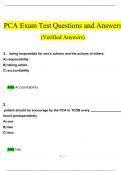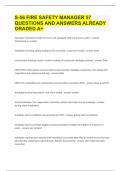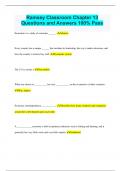Assignment 6 2024
Unique #:
Due Date: October 2024
This document includes:
• Helpful answers and guidelines
• Detailed explanations and/ or calculations
• References
Connect with the tutor on
+27 68 812 0934
,© Study Shack 2024. All rights Reserved +27 68 812 0934
, QUESTION 1
1.1.
10 Points on How Symbolic Play Impacts Children's Later Development
1. Development of Imagination and Creativity (Ages 2-5)
Symbolic play, where children use objects to represent other things,
encourages imagination and creativity. For example, when a child uses a stick
as a magic wand, they are engaging in imaginative thinking. This creativity
fosters problem-solving skills in later years, allowing children to approach tasks
from multiple perspectives.
2. Enhancing Cognitive Skills (Ages 3-5)
Symbolic play helps children develop cognitive abilities such as abstract
thinking. For instance, using a cardboard box as a car shows the ability to
understand symbolism, which is essential for future academic skills like reading
and math, where symbols (letters, numbers) represent objects or quantities.
3. Language Development and Communication (Ages 2-5)
During symbolic play, children explain their play scenarios, expanding their
vocabulary and language skills. For example, when children pretend to run an
ice cream shop, they practice naming flavors and describing their offerings,
which strengthens their ability to express ideas and communicate clearly.
4. Social Skills and Cooperation (Ages 3-5)
Symbolic play often involves playing with peers, requiring children to negotiate,
share, and collaborate. For example, children pretending to be pirates on a ship
must decide who will steer the ship and who will search for treasure. These
interactions build social skills essential for teamwork and cooperation in later
life.
© Study Shack 2024. All rights Reserved +27 68 812 0934





















